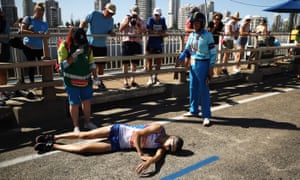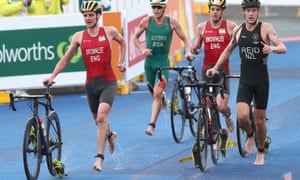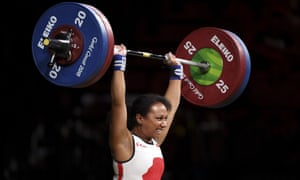The organisers of Birmingham 2022, possibly daunted by following an event so well received on the ground, may have felt some relief as the Gold Coast Commonwealth Games ended on a bum note.
Furious spectators and even the host broadcaster condemned a closing ceremony that barely paid a passing mention to the athletes. Usain Bolt, paid to be here by a telecommunications company and still the biggest draw even eight months into retirement, was on the DJ decks and a Kylie Minogue impersonator featured.
But the athletes had already been seated before the show began, an outrage which reached the Queensland premier, Annastacia Palaszczuk. “I’m just as disappointed as anyone else,” she said. “We wanted to stand there and celebrate our athletes and it didn’t happen. Whoever was responsible for making that decision should hang their head in shame.”
A mea culpa followed from the Commonwealth Games chairman, Peter Beattie. “We wanted to get the athletes in early but we made a serious error of judgment by not having them in the broadcast,” he said. “It was driven by concerns about the welfare of athletes but they should have been involved. There were too many speeches, I shouldn’t have spoken because it bored the athletes silly.”

A potentially more serious oversight unfolded on the marathon course when the Scottish runner Callum Hawkins collapsed with heat exhaustion and was left on the road for several minutes without medical attention as spectators snapped selfies. He was released from hospital on Monday.
These were rare errors from an organising committee which delivered 11 days of slick operations, mostly full stadiums and a notable absence of traffic jams, helped by the exodus of locals scared off before the Games began by regular warnings of impending chaos.
Where Birmingham could struggle to compete is with the stunning vistas, particularly the sandy beaches and turquoise waters that provided the backdrop to the open-air aquatics centre and the volleyball stadium. The venues for the gymnastics, cycling and netball were sold out for almost every session, pumping with music and entertaining sport.

The only disappointment was that many of England’s leading names failed to perform. The Brownlee brothers arrived slightly injured and left without medals. Max Whitlock was outshone on the pommel horse by the 17-year-old Rhys McClenaghan from Northern Ireland. The world indoor champion hurdler Andrew Pozzi and the Olympic medallist hammer thrower Sophie Hitchon faltered, and Adam Peaty was beaten in the pool for the first time in four years.
But at least they showed up. Bolt was bemused that some of England’s best sprinters, including CJ Ujah, who had every chance of winning a 100m medal, did not travel. Sebastian Coe, the president of athletics’ governing body the IAAF, was also surprised. “My gut instinct is try to not sit out championships because they are important at the end of your career,” he said. “When you turn your cards over it’s medals that people judge you on, not fast times in the Diamond League.”
While Scotland and Wales comfortably exceeded their best medal hauls at an away Commonwealth Games, analysts suggested it was England’s second worst showing in 21 Games as they won 16.2% of the medals on offer. Their only poorer performance was Melbourne 2006. The timing of the Games in the southern hemisphere, when our best athletes would usually be in heavy training, does not help, so they will almost certainly bounce back in July 2022.
These Games will be recalled in England not for the medal table but for the netball team, who provided the most thrilling and unexpected result by beating Australia. The tales of perseverance and triumph against the odds also cut through. The weightlifter Zoe Smith, who has battled injury, funding cuts and worked as a waitress between training, won silver, just days after having an epidural to ease agonising pain.

No stranger to heartache was the 400m hurdler Kyron McMaster of the British Virgin Islands, who won gold only months after his coach was killed by Hurricane Irma.
Tom Daley produced a performance which will live longer in the memory than any perfectly executed back 3½ pike. “There are 37 countries in the Commonwealth where it’s illegal to be who I am; hopefully we can reduce that number,” he said, calling on the 37 of the 53 countries where homosexuality is illegal to change their laws.
Given that number was 43 four years ago in Glasgow, it is not a hopeless plea. Where other sporting bodies scarper at the mere mention of politics, the Commonwealth Games Federation chief executive, David Grevemberg, actively promotes discussion of human-rights issues.

The Rwanda women’s beach volleyball team were encouraged to wear black armbands to mark the 24th anniversary of the genocide, while Australia’s indigenous culture, which it still wrestles with, was a major part of the opening ceremony.
The question which pervades every Commonwealth Games is “do they really matter?” From a sporting perspective it is impossible to argue they compare with the Olympics or a world championships. But the Games has shown once again that they offer something wholly, often wonderfully, different.